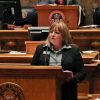The United Nations’ Intergovernmental Panel on Climate Change (IPCC) released a report Monday revealing, once again, the dire state of the climate crisis.
Joe Salazar, executive director of the environmental advocacy group Colorado Rising and former state House representative, was filled with familiar feelings of dread and anger when he read it.
“Reading the report, I had both a visceral, emotional reaction to it as well as a more logical way I reacted to it,” Salazar said. “The visceral reaction was me asking, ‘What the hell is it going to take for us to realize we’re in trouble. How many more reports is it going to take?’”
The IPCC report, a collaboration between over 200 climate scientists and 14,000 studies, directly tied global extreme weather events to human-made climate change and outlined the urgent need to drastically cut emissions.
“The logical reaction was, ‘What are we going to do about it,’” Salazar continued. “The report told us that some of our effects on the climate are irreparable now. We’ve already crossed some thresholds and now we have to think about how we prepare for the future. We need to transition to clean green energy. Solar. Wind. Hydrogen. This also all means that our elected officials need to grow the hell up.”

Just two days before the release of the IPCC report the Denver metro area experienced the worst air quality in the world due to wildfires blanketing the west. The IPCC released an interactive atlas showing that in Colorado and across the west wildfires, flash floods, mudslides, drought, extreme heat, and air pollution will continue to get worse in coming years. Snowpack in Colorado will also continue to decline, further straining water resources.
Environmental advocacy groups called for Colorado to take further action to try and slow down the state’s greenhouse gas emissions, as well as take other actions to repair the climate.
Earlier this year, Gov. Jared Polis (D-CO) released an emissions reduction roadmap and signed a major climate bill into law, but environmentalists argue Polis does not go far enough in addressing climate change.
“We’re not moving fast enough in Colorado,” Salazar said. “And then we got pushback from the governor because we were going to hold him accountable for reaching our air quality standards. Talk about an irresponsible way to respond to the climate crisis. … It’s a repeated history of elected officials not wanting to be held accountable and not really recognizing the dire situation we’re in.”
In light of the IPCC report, Micah Parkin, executive director of 350 Colorado, a group aiming to eliminate fossil fuel production, released a statement Wednesday calling on Polis to completely phase out fossil fuel extraction in Colorado by 2030.
“Colorado cannot claim to be doing its part to address the climate crisis and continue to allow fracking companies to extract and produce ever more oil and gas, which is polluting our air and overheating our climate,” said Parkin. “Governor Polis needs to respond with the bold leadership that voters expected of him and that scientists are calling for by implementing a rapid, just transition off fossil fuels, beginning with a managed decline of shale oil and gas production in Colorado.”
In February, 350 Colorado was one of over 60 Colorado groups that demanded Polis change his roadmap to phase out oil and gas. Polis’s roadmap actually allows for an increase in fracked oil production. In January, a report found that the oil and gas industry is responsible for 70% of Colorado’s greenhouse gas emissions.
“This also all means that our elected officials need to grow the hell up.”
Joe Salazar
In addition to phasing out oil and gas production, Salazar suggested the state take action to invest in renewable energies and the infrastructure it requires (which Polis’ roadmap does emphasize) and provide incentives for water conservation and growing carbon-sequestering crops like hemp.
Colorado environmental groups are also pushing for action at the federal level. Roughly 80% of Coloradans support congressional action on climate change.
U.S. Rep. Joe Neguse (D-CO) classified the IPCC report as an alarm bell in a statement released Monday.
“We must act with urgency and boldness to address the climate crisis and save our communities,” Neguse said. “There is a very narrow and rapidly closing window to avoid catastrophic outcomes. Responding to this crisis is a generational moment, and we must have the political will to meet it.”
Neguse is chair of the U.S. House Subcommittee on National Parks, Forests, and Public Lands and last week had his proposal to create a “Civilian Climate Corps” included in the budget reconciliation package.
Reconciliation is a filibuster-proof way for U.S. Senate Democrats to push through some of their more progressive policies, without GOP support. Included in the reconciliation package is climate policy that would have to still have to win over moderate Democrats like U.S. Sen. Joe Manchin (D-WV) in order to pass.
Yesterday, environmental activists rallied outside U.S. Sen. John Hickenlooper’s (D-CO) office in Downtown Denver demanding he resist cuts to climate, jobs, and infrastructure items in the reconciliation package.
At the protest were groups like Colorado Sierra Club, Colorado Jobs with Justice, and 9to5 Colorado.
“As the global pandemic spikes again, we’re also facing a devastating wildfire season, perpetual heat waves, drought, mudslides, and other extreme weather events linked to climate change,” said Sarah Clark from Colorado Sierra Club. “Congress must use their power to pass a robust budget reconciliation bill that invests in climate solutions, care, jobs, and justice.”
The activists displayed a giant banner outside of Hickenlooper’s office that read, “Hickenlooper, No Climate = No Deal.”
“Voters of color turned out in record numbers to make their voices heard on climate change, racial injustices, and care and community investment so we are expecting our elected officials to do right by us,” said Andrea Chiriboga-Flor, state director of 9to5 Colorado.

A provision to make electric cars more affordable written by Hickenlooper was included in the bipartisan infrastructure bill that passed on Tuesday. The climate provisions in the budget reconciliation bill are expected to be negotiated over the next few weeks.
The ‘Seven Generations Principle,’ an ancient philosophy of the Haudenosaunee — or Iroquois — people, asks its leaders to think carefully about how their decisions will affect the next seven generations the follow them. Salazar explained that this concept is a driving force behind his passion for environmental justice advocacy.
“I’m Indigenous,” Salazar said. “I’m Indigenous to Colorado, my family has been here — both Spanish and Indigenous sides — for centuries. I was raised to know that we are caretakers of the Earth and that we deeply understand what happens when you don’t take care of the Earth. I’ll be damned if I go to the creator and say that I didn’t do everything I could to try and help out Mother Earth and the future generations. I want to be proud and say that I fought for them. That’s why I do what I do.”
When asked about hopefulness or optimism for the future, the possibility that humanity still has time to make significant changes to their behavior concerning the environment, Salazar thought for a while before answering.
“I don’t know,” Salazar said. “I don’t know what it’s going to take. Is it going to take more tragedy before we grow up? I’m at the point where I think that might be what it takes. The great thing about humanity is that normally we step up when we’re forced to. Unfortunately, we were forced to about two decades ago. Maybe we’ll catch up to ourselves.”



